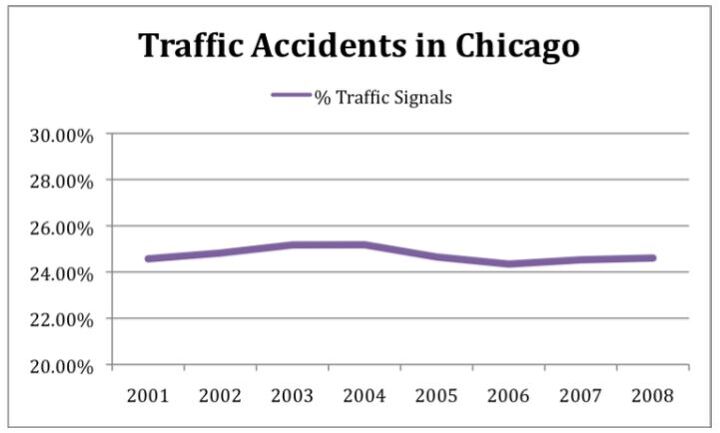Illinois: Study Finds No Benefit To Chicago Red Light Cameras
A new study of the country’s largest red light camera program found no significant benefit to the use of photo enforcement. Rajiv Shah, an adjunct professor at the University of Illinois at Chicago released the final version of his exploratory analysis into Chicago’s photo ticketing program, which boasts 188 cameras.
Shah’s analyzed Illinois Department of Transportation data obtained by the Chicago Tribune which showed that although accidents dropped seven percent at intersections citywide, fifty camera-monitored intersections saw a five-percent increase in accidents. The city used its own, much narrower dataset to claim a significant decrease in accidents. The city only had ten usable intersections and defined “accident” in a way that limits reporting of rear end collisions that take place farther from the intersection. Shah recrunched the numbers and found a net safety benefit of just 1.5 percent.
“The goal was not to do a comprehensive study of red light cameras, but only to ask whether the benefits of red light cameras are obvious,” the study concluded. “A more comprehensive study would include control groups. In sum, our findings show that red light cameras have, at best, a marginal positive impact on accidents. It’s clear that the benefits claimed by the city are hyperbole and that there is no evidence that the red light camera have had a significant safety benefit.”
Because of the limitations of the available data, Shah examined the so-called “halo effect” that insurance industry first postulated in its 2001 Oxnard study and has since become the primary talking point in favor of using automated ticketing machines. According to the theory, drivers afraid of receiving tickets will improve their habits. As a result, accidents will fall at intersections throughout the city — not just where cameras are located. In Chicago, this has demonstrably not taken place. Shah showed that from 2001 to 2008, the percentage of accidents that took place at intersections did not decrease, rather it remained steady at about 25 percent of collisions.
“This also suggests the red light cameras are not having a halo effect because accidents are not dropping throughout the city at traffic signals,” the report found.
In an email to TheNewspaper, Shah explained that he became interested in looking more closely at the red light camera issue while studying the city’s general surveillance camera network. The city has apparently exaggerated the effectiveness of these devices in solving and deterring crime, so Shah decided to see whether the same was true of intersection cameras.
View the study in a 250k PDF file at the source link below.
Effectiveness of Red Light Cameras in Chicago: An Exploratory Analysis (University of Illinois at Chicago, 6/17/2010)
[Courtesy: Thenewspaper.com]
More by The Newspaper
Latest Car Reviews
Read moreLatest Product Reviews
Read moreRecent Comments
- FreedMike Apparently this car, which doesn't comply to U.S. regs, is in Nogales, Mexico. What could possibly go wrong with this transaction?
- El scotto Under NAFTA II or the USMCA basically the US and Canada do all the designing, planning, and high tech work and high skilled work. Mexico does all the medium-skilled work.Your favorite vehicle that has an Assembled in Mexico label may actually cross the border several times. High tech stuff is installed in the US, medium tech stuff gets done in Mexico, then the vehicle goes back across the border for more high tech stuff the back to Mexico for some nuts n bolts stuff.All of the vehicle manufacturers pass parts and vehicles between factories and countries. It's thought out, it's planned, it's coordinated and they all do it.Northern Mexico consists of a few big towns controlled by a few families. Those families already have deals with Texan and American companies that can truck their products back and forth over the border. The Chinese are the last to show up at the party. They're getting the worst land, the worst factories, and the worst employees. All the good stuff and people have been taken care of in the above paragraph.Lastly, the Chinese will have to make their parts in Mexico or the US or Canada. If not, they have to pay tariffs. High tariffs. It's all for one and one for all under the USMCA.Now evil El Scotto is thinking of the fusion of Chinese and Mexican cuisine and some darn good beer.
- FreedMike I care SO deeply!
- ClayT Listing is still up.Price has been updated too.1983 VW Rabbit pickup for sale Updated ad For Sale Message Seller [url=https://www.vwvortex.com/members/633147/] [/url] jellowsubmarine 0.00 star(s) (0.0) 0 reviews [h2]$19,000 USD Check price[/h2][list][*] [url=https://www.ebay.com/sch/i.html?_nkw=1983 VW Rabbit pickup for sale Updated ad] eBay [/url][/*][/list] Ceres, California Apr 4, 2024 (Edited Apr 7, 2024)
- KOKing Unless you're an employee (or even if you are) does anyone care where physically any company is headquartered? Until I saw this story pop up, I'd forgotten that GM used to be in the 'Cadillac Building' until whenever it was they moved into RenCen (and that RenCen wasn't even built for GM). It's not like GM moved to Bermuda or something for a tax shelter (and I dunno maybe they ARE incorporated there legally?)

































Comments
Join the conversation
I just got my very first red light ticket the other day. Here's the problem, as I see it: I don't remember pushing through the light in question. I realize that this may simpy be a failure of memory on my part. The incident occurred one month ago. I have a very serious problem with this because, unlike with an officer-issued ticket, it makes it much, much harder to proffer a defense should I choose to fight the ticket. The only reason I remember that particular drive is that I was on my way to deal with a serious family issue. I'm firmly in the "it's for revenue" camp, but the far more frightening thing from my perspective is the erosion of the rights and resources of the accused. BTW, this is the ticket I've gotten while driving a car since I was first licensed over 35 years ago.
Soooooo, a government in northern Illinois might have acted less than squeaky clean and not entirely above the board? Stop the presses!!